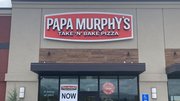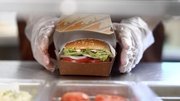Article
Taco Bell offering paid sick days, $100,000 GM salaries
Taco Bell is upping the ante on QSR industry employer desirability and packaging sustainability with its 2020 commitments.

January 9, 2020
Taco Bell said it will not only offer paid sick days to company-owned store employees, but also test annual restaurant GM salaries of $100,000 at some of those locations, which make up about 10% of the brand's 7,000 stores. The brand also pledged today to replace all consumer-facing packaging systemwide with recyclable, compostable or reusable alternatives by 2025, according to a Taco Bell spokeswoman.
Taco Bell's so-called "2020 commitments" help advance the taco-centric brand as both an employer of choice in the extremely tight QSR labor market and as a conscientious corporate citizen in the world community -- an increasingly important asset to QSR customers.
Additionally, the brand said it will intensively work to be the No.1 QSR choice for vegetarian dining options, a goal it has already made significant strides toward through its vegetarian menu, featuring 10 separate options. The QSR also allows diners to make most of its regular menu options vegetarian through ingredient substitutions.
But among the four major commitments made today, those moves toward making the brand "glow" a little more brightly in the eyes of potential store employees may be the most pivotal and game-changing for the QSR market, even though the initiatives are currently limited to company-owned locations.
Betterbenefits
QSRweb spoke with Taco Bell Senior Director of Global Training and International Human Resources Ferril Onyett for more insight into the changes which include 24 hours of paid sick time to each employee at a company-owned store this year. She said the decision to extend the offer on this limited basis was based on employee feedback. The benefit is a relative rarity for hourly employees in the QSR sector, despite the fact that sick employees handling food is often the cause food safety issues.
"We don't want team members to feel like they need to put a day's pay before their well-being," Onyett said in an interview with this website. "Additionally, prioritizing our team members' health is key to maintaining a safe and clean environment in our restaurants.
"When we talk to employees about why they come to work when they are sick, they often tell us that they can't afford to miss a day of pay. We want them to be their best self while working so that they can provide a great experience for our customers."
Onyett said finding top-quality managers is just as big a priority to the brand's path forward, which is why the test of the higher salaries for general managers is being executed, she said. The brand did not provide details about how many stores would offer the $100,000 GM salaries nor their locations. But suffice to say the higher salary is well above the $48,238 that employer information and recruitment website, GlassDoor.com, puts the brand's average current GM salary at.
"We are constantly exploring new ways to invest in our people, enhance morale and boost recruitment and retention," Onyett said. "We are really focused on managers; they have a huge impact on the performance of the restaurant, customer experience, team member satisfaction. When restaurants have great managers, the people and the business thrive.
"Great managers empower their teams, lift others up and position more junior employees to grow. They serve as a great example for team members about the career and growth opportunities Taco Bell provides and often show others the stepping stones for being promoted."
 Taco Bell is also introducing a program called, "Makers," as a kind of leadership prep school position with the brand. It's designed for employees who want to get some leadership experience, but not to the extent of a general manager. Additionally, the brand is adding to its pool of available funds in its long-running Live Mas' Scholarships to help further its prominence as a top workplace.
Taco Bell is also introducing a program called, "Makers," as a kind of leadership prep school position with the brand. It's designed for employees who want to get some leadership experience, but not to the extent of a general manager. Additionally, the brand is adding to its pool of available funds in its long-running Live Mas' Scholarships to help further its prominence as a top workplace.
Goinggreen
On the scale of the global community, however, Taco Bell's commitment today to convert all its customer-facing packaging to cleaner, greener alternatives, may be the most notable move. The chain pledged that it would convert its entire system to all sustainable packaging by 2025, meaning recyclable, compostable or reusable alternatives will be subbed in for packaging that does not already offer those benefits. It will also add recycling and/or composting bins at its locations.
"We're collaborating with suppliers, franchisees, industry partners and local markets around the globe to test a variety of packaging that will not only be more eco-friendly, but also deliver the best customer experience in terms of convenience and functionality," Taco Bell Manager of Global Nutrition & Sustainability Missy Schaaphok told this website in an interview. "The changes will impact everything handled by our customers, such as our taco wrappers and holsters. Some of our existing packaging is already recyclable, such as our cold beverage cups and our fiber-based $5 boxes.”
All photos: Provided
 ChatGPT
ChatGPT Grok
Grok Perplexity
Perplexity Claude
Claude








